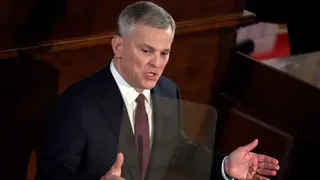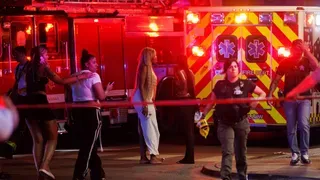June 10, 2011
June 8 Marked Caribbean-American HIV/AIDS Awareness Day
Kevin Mark Kline READ TIME: 4 MIN.
June 8 is Caribbean-American HIV/AIDS Awareness Day. As the world reflects on the 30 years since the first HIV diagnosis, the Caribbean-American community is facing a grim reality: HIV/AIDS remains an alarming epidemic. Medical professionals and New York Times best-selling author, JL King say sexual secrecy is the culprit.
Here's a stark fact: HIV/AIDS infection rates in the Caribbean are among the highest in the world second only to Sub-Saharan Africa. Even though Caribbean Americans comprise less than 10 percent of the total U.S. population, they are included in the disproportionately high rate of new HIV/AIDS cases that occur in Black Americans.
How is this happening? According to Florida's Department of Health, 67 percent of Caribbean-born Black males in the state contract HIV/AIDS through heterosexual sex while 26 percent is through homosexual contact.
It's a much different story for Florida's female Caribbean population, 95 percent of them get HIV/AIDS through heterosexual sex. The remaining 5 percent is from intravenous drug use and "other."
Those numbers could mean any number of scenarios, says Dr. Cheryl Holder, medical director at North-Dade Health Center. "They suggest that one heterosexual man could infect several women in serially monogamous relationships. Another possibility is bisexual men or women juggling several men." Dr. Holder says the bottom line is unprotected sex is a problem for both men and women.
Lorene Maddox, a data analyst with Florida's Department of Health agrees. She says an unknown number of Caribbean-American men have sex with both men and women. "It is also understood that men in general who are bisexual often do not disclose that they have sex with other men, therefore the classification of heterosexual may be over-represented."
Compounding the issue is the taboo and stigma associated with sex and homosexuality. As in many minority communities, Caribbean-Americans have taboos against discussing sex and sexual matters related to HIV risk. There's also a shame and secrecy associated with homosexuality. To say it's not openly discussed is an understatement.
"There's so much homophobia in the Caribbean community. Everyone pretends they are not having sex. Married people are not supposed to cheat, but many people are," said Dr. Holder.
Holder treats women, both young and old from the Caribbean islands. Many of them were infected by their partners who never mentioned being HIV positive. She thinks things will change only if people become more willing to talk more frankly about sex.
"When you come from a culture where men having sex with men is criminalized and viewed as immoral it's difficult to have frank talks about sexuality," she said.
Holder says June 8 should be a day to have open conversations about sex, sexuality and tolerance. "We need to talk about these issues. Everyone should be tested. HIV testing should be a regular part of a routine physical. It's part of life. In the Caribbean especially, the stigma drives the disease underground and it continues to spread."
Author/HIV activist JL King wrote the best-selling book, On the Down Low: A Journey Into the Lives of Straight Black Men Who Sleep with Men. He agrees that the prevalence of HIV/AIDS in the Caribbean American community has to do with the culture. He attributes the sexual risk taking by men to fear, a lack of education about sex, and a lack of opportunity to be open about sexuality.
The term "down low" describes men, who identify as straight and have a female partner, but have sex with other men in secret. In the vast majority of cases, the woman in the relationship is unaware of her partner's activities.
King recently saw that risky behavior in Atlanta. "I met 3 men from the [Caribbean] islands last week after the Caribbean Festival and we ended up back at my house to have sex. They were in town and after some conversations, it was clear that they wanted to have sex. My goal was to see how far they would go and found out that all 3 were on the DL on their islands," King said.
Those men didn't know who King was. And while he did not have sex with them, it was clear they were more than willing to do it, without any sort of discussion about HIV status. "They try to get to the states to hook up with men for sex as often as possible. I was shocked at how easy they were willing to have sex with a stranger."
But King also sees a broader problem. First among them, is a lack of fear about HIV. "Old messages are still being used by health departments and no one is listening," King tells SFGN.
So looking ahead, what can be done to change things? King says having frank conversations beginning with the church is a great first step. He says people need to realize that the Internet has made it too easy to get sex. And because of the need for fast and easy sex, no one has time to think about their actions. Also, there needs to be real people talking about HIV and sexual behavior that people can relate to.
Dr. Holder agrees. "As much as HIV/AIDS is preventable, we don't have open discussions about sex. That's especially true for young people when they are not prepared. There are many steps to be able to get that condom on every time. It sounds simple, but it isn't," she said.





